Naked, alone and living on dog food – all for a TV show that gripped a nation
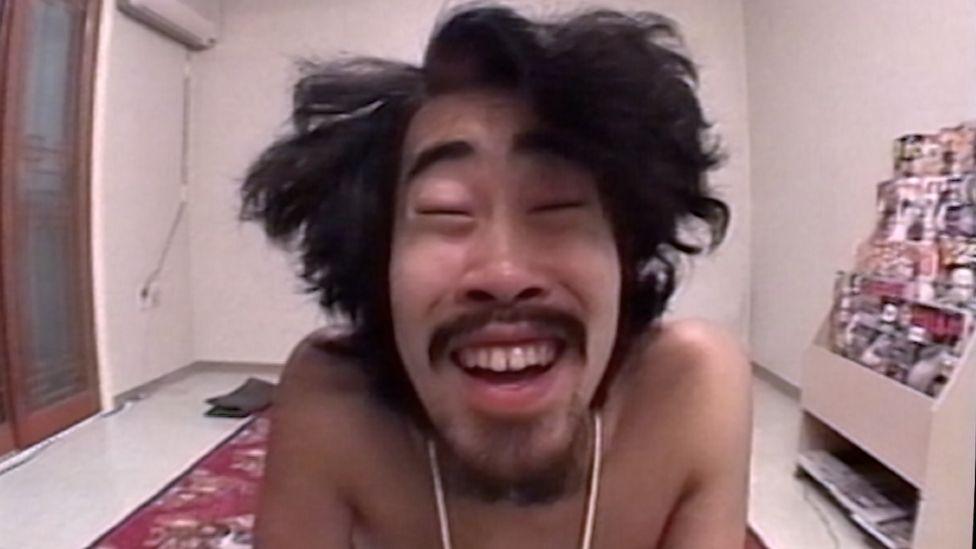
Nasubi appeared on Japanese TV in 1998, before The Truman Show and Big Brother
- Published
In 1998, a Japanese man was stripped naked and left alone in an almost-empty apartment as part of a challenge for a reality TV show.
Tomoaki Hamatsu, known as Nasubi, was left with only a pen, some blank postcards, a telephone and rack full of magazines.
But he was not there to read. The concept of the show was to see if a human being could survive on competition prizes alone.
In order to win the challenge, the value of the prizes he won had to reach a certain financial threshold - 1m yen, around £6,000 at the time.
He would not emerge for 15 months, following a gradual descent into depression and mania, driven by hunger and isolation. Nearly three decades later, Nasubi's ordeal is being revisited as part of a new film that has just screened at the Sheffield Documentary Festival.
"I came across his story when I was working on a different project and got lost down one of those internet rabbit holes," recalls Clair Titley, director of The Contestant.
"But I found that a lot of what I had come across was almost derogatory. Nothing had really talked about Nasubi's story in depth. [I had] all these questions such as, why did he stay in there, and what effect it had on him. So I contacted him with that premise, that I wanted to make a film about his experience."
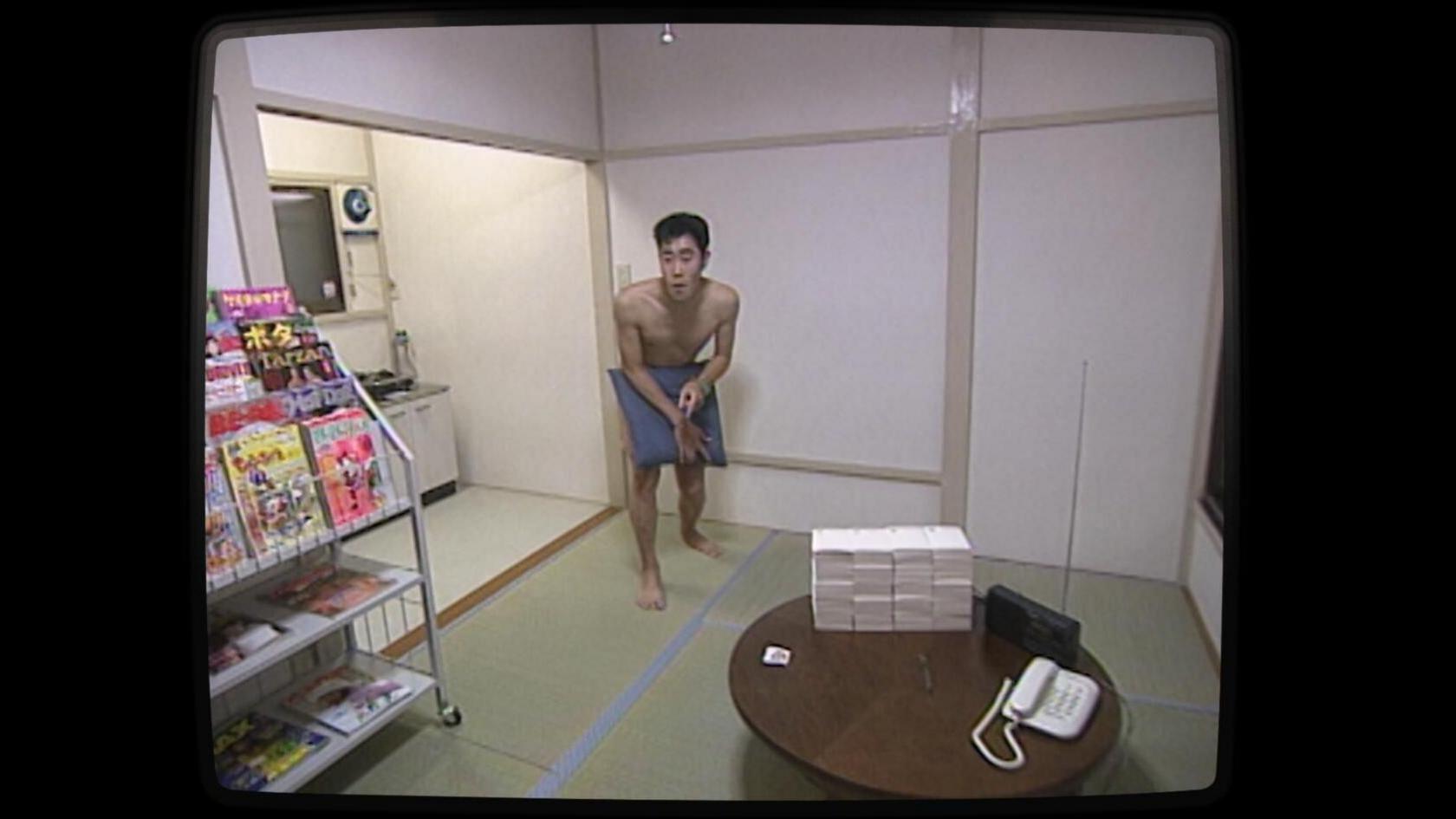
Nasubi entered thousands of magazine competitions to win prizes that would help him survive
Nasubi, who had been randomly selected at an open audition, knew he was being filmed, but the explanation given to him about where the footage would end up was vague, and left him with the impression it probably wouldn't be broadcast.
In reality, the 22-year-old was gradually becoming one of the country's biggest celebrities as weekly updates on his progress became one of the most popular segments of variety show Denpa Shōnen.
Critics mostly hated the programme, but it attracted a huge audience of young viewers.
The show began airing before the release of The Truman Show, starring Jim Carrey as a man who doesn't know his life is being broadcast as a TV series.
And it would be another year before Big Brother would launch in the Netherlands, ushering in a whole new era of reality television.
But despite being a harbinger of things to come, there remains relatively little awareness of A Life in Prizes, as the segment was known, outside his home turf.
"I think people have heard about it more in the last decade, since YouTube has really exploded," Titley tells BBC News. "But at the time, it was never shown outside of Japan and South Korea. It was never intended to be shown outside of that world."
Nasubi, an aspiring comedian at the time, knew little detail of what the challenge would be before it started.
He was left in the windowless room without clothing or basic essentials - not even toilet paper - and had no contact with the outside world.
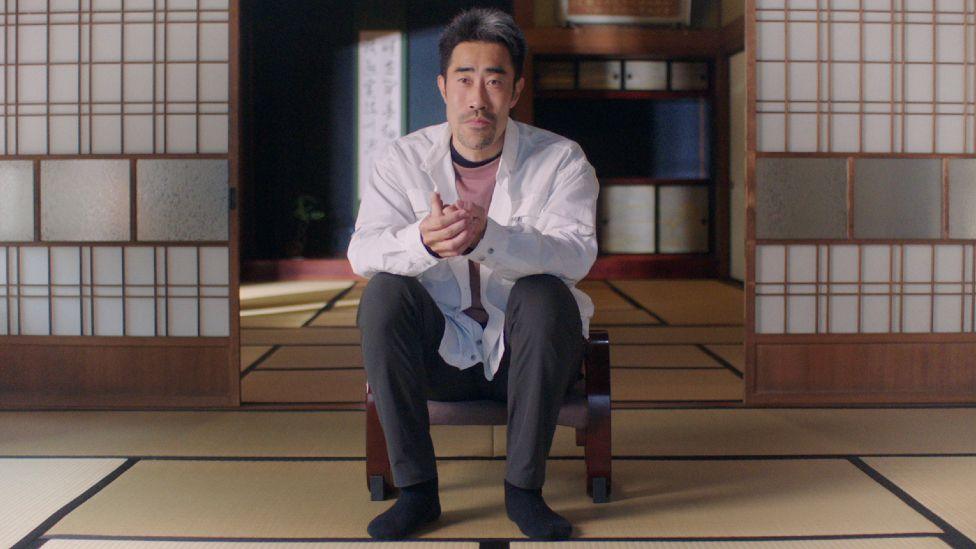
The film features a new interview with Nasubi as he reflects on his ordeal nearly three decades later
The Contestant features new interviews with both Nasubi and the producer who masterminded the segment, Toshio Tsuchiya.
Other contributions come from those who were involved in covering it - including a former BBC correspondent who was based in Japan.
But so much of the story is contained within the footage itself, with viewers of the documentary following Nasubi's progress in the same way TV viewers did at the time.
Titley says she and her team went through the original footage "painstakingly" to strip out much of the original furniture.
"All the footage was covered in Japanese graphics, it's got Japanese narration, canned laughter, sound effects, it's a cacophony of noise and graphics," she explains. "So we tried to allow an English-speaking audience to understand what it was like."
The team covered the Japanese graphics with English equivalents, and recreated the audio as accurately as they could. An English-speaking narrator was employed to translate the original commentary.
The resulting documentary has already been released on Hulu in the US - with critics as fascinated by the story as they are repulsed by Nasubi's ordeal.
The Contestant is "both a can’t-look-away car wreck and an indictment of viewer complicity," said Rolling Stone's David Fear., external
"A chronicle of a media phenomenon, a reality TV landmark and a psychological nightmare packaged as entertainment, it is the type of documentary where you’re aware that what you’re witnessing is 100% true, and you still can’t quite wrap your brain around what you’re seeing."
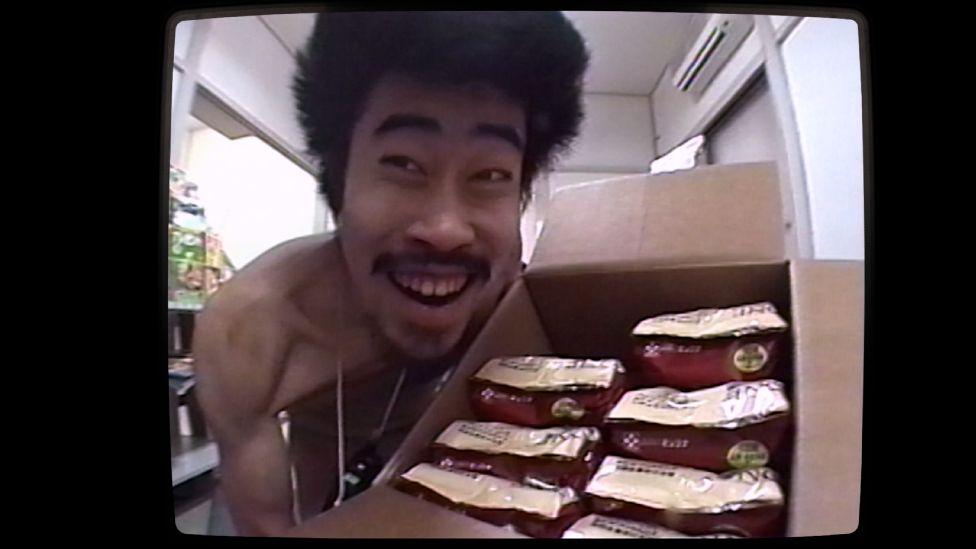
The show's producer says there was a possibility of Nasubi dying if he hadn't won rice
IndieWire's David Ehrlich described, external the original footage as "so hypnotically sadistic" that the newer material struggles to compete with it.
"None of the film’s retrospective interviews, candid and thoughtful as they are, prove as gripping as the raw video of Nasubi’s ordeal," he said.
"Titley’s film is ultimately less of a commentary on an entire medium than it is a study of one of that medium’s most remarkable characters."
As the show progressed, Nasubi was successful in many of the competitions he entered - but the prizes he won weren't always of much use.
Among them were tyres, golf balls, a tent, a globe, a teddy bear and tickets to Spice World: The Movie.
The fact he was getting weaker seemed of little concern to the producers, one of whom suggests in the documentary that Nasubi could have died if he didn't win rice in one of the prizes.
He later also won sugary drinks and dog food, which he survived on for several weeks.
Around 15 million viewers tuned in to see his wins, and how he used them in his efforts to survive.
Nasubi remained naked for his entire time taking part, because he never won a wearable item of clothing (his genitals are covered by a floating aubergine emoji added by producers).
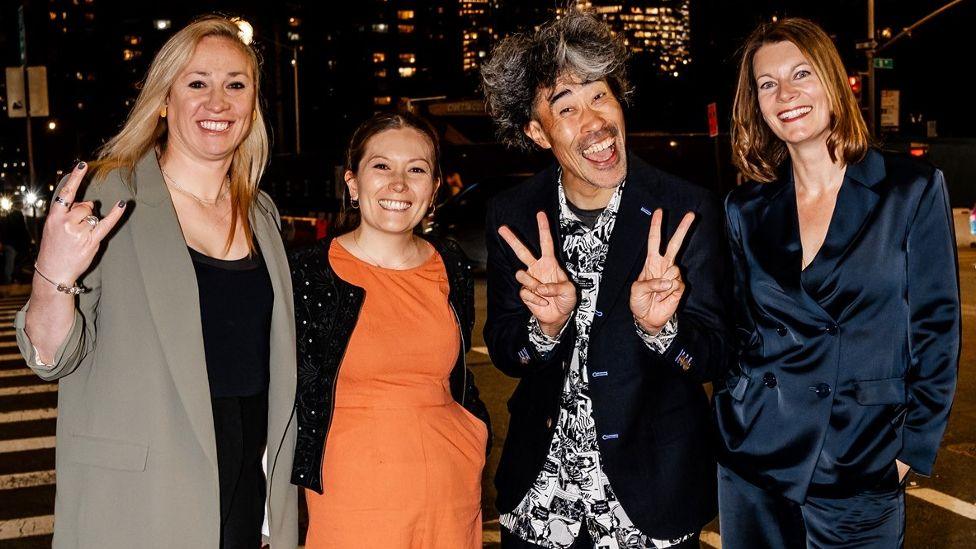
Left to right: Producers Andee Ryder and Megumi Inman with Nasubi and director Clair Titley
The door to the apartment wasn't locked and Nasubi was theoretically allowed to leave any time he wanted. So why didn't he?
"I think there are a lot of reasons," Titley says. "One is he's very stoic, and that's because of where he comes from in Fukushima, and his parents, who were very strict.
"He's also a very loyal person. He didn't want to get into trouble, and he was very young and naive. He's still incredibly trusting now. And there is also that Japanese Samurai spirit of 'I will prevail and I will stick through this'."
Suffering
Nearly three decades later, Nasubi has described the show as "cruel", adding that there was "no happiness and no freedom".
"Maybe three or five minutes a week out of my life [were shown]. And that was edited to highlight my happiness when I won [a prize]," he told Deadline, external.
"Of course, viewers would say, 'Oh, see, he's doing something fun and something that he’s enjoying…' But the majority of my life was suffering."
And yet, he doesn't come across in the documentary as bitter about this experience, and Titley says her impression was that "he's in such a positive place now".
"When people have asked him if he regrets it, he always says that while he wouldn't want to do it again, he wouldn't be the person that he is [otherwise]," she says.
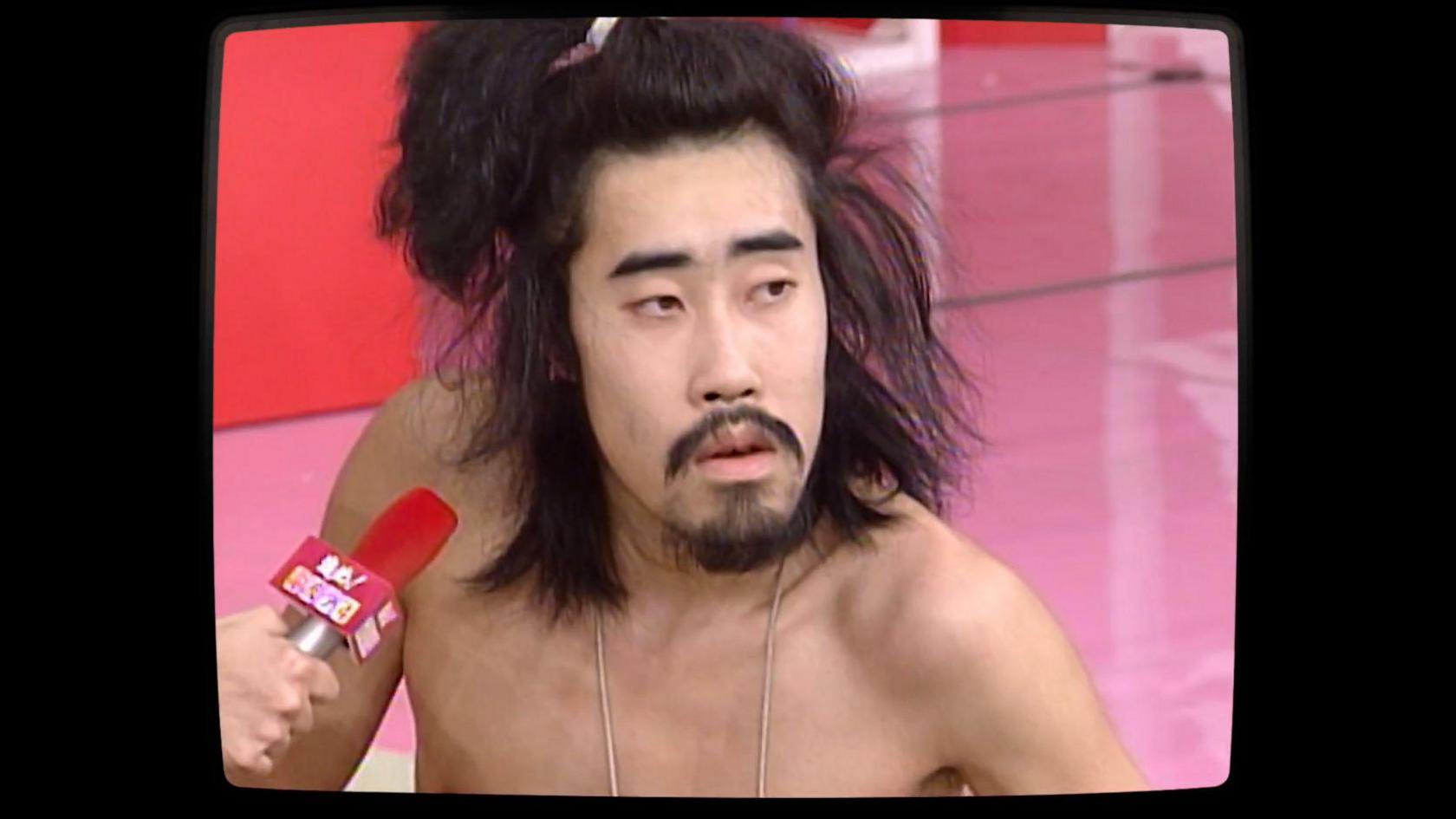
Nasubi was astounded when he was greeted by a live studio audience cheering his name as the show ended
Nasubi was finally released via a Michael McIntyre-style stunt, in which he was taken into a new fake room before the walls collapsed to reveal he was actually on stage in front of a live audience cheering his name.
The documentary also follows Nasubi after his release, showing his efforts to use his newfound fame for good causes - finally providing him with a sense of fulfilment.
Titley says Nasubi felt the timing was right to revisit his story, adding he "had maybe found some peace with what had happened".
Duty of care practices in the 1990s are not what they are today - and it's unlikely viewers would stand for such a format now.
But the documentary raises questions about where to draw the line when it comes to entertainment - and how much audience appetite is to blame.
"I would love people to reflect on their own relationships with social media and reality television," Titley says, "and how complicit we all are as viewers and consumers."
The Contestant is out in UK cinemas on Friday 29 November.
- Published13 June 2024
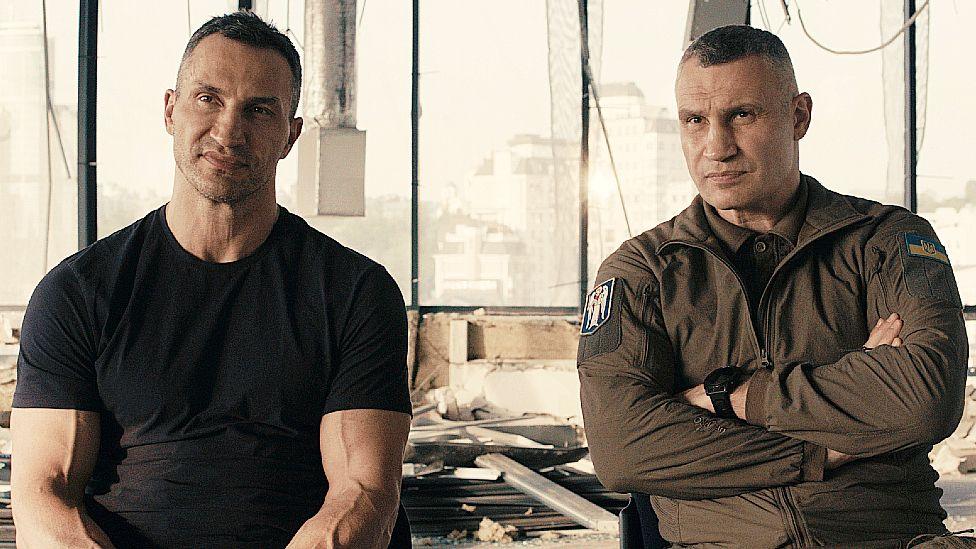
- Published18 November 2024
